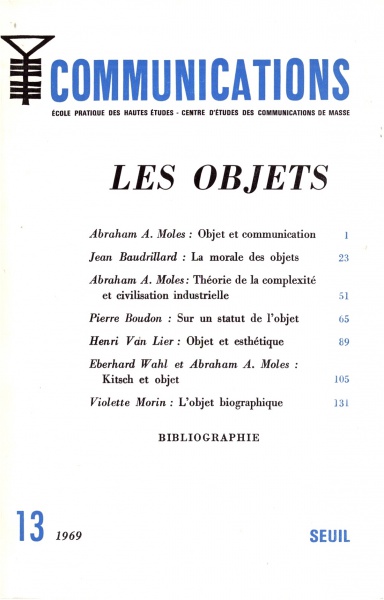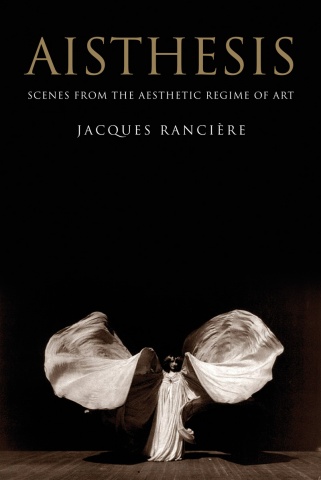Moles, Baudrillard, Boudon, van Lier, Wahl, Morin: Les objets (1969/71) [French, Spanish]
Filed under book | Tags: · 1968, aesthetics, design, object, philosophy, political economy, psychology, semiotics, sociology, theory

Communications is a biannual social sciences journal founded by Georges Friedmann, Roland Barthes, and Edgar Morin. Soon after its start in 1961 it became a reference publication for media studies and semiotics in France and internationally.
Its first 1969 issue was dedicated to the theory of objects, positioning it “at the confluence of sociology, political economy, social psychology, marketing, philosophy, design and aesthetics” (p 141). At the same time the journal argued for the relevance of the study of objects for governmental institutions such as “the Ministry of Industrial Production, the Ministry of Transport, the customs authorities, the courts, the counterfeits studies, or the National Industrial Property Institute” (p 141).
It can be read as a post-May 1968 attempt to use the concept of object as an agent linking social sciences in order to increase their impact on direct political change, and as well as an early echo of what more than a decade later came to be known as the actor-network theory.
Two years later the magazine appeared in its Spanish translation in book form.
Communications 13
Publisher Centre d’études des communications de masse, École pratique des hautes études, and Seuil, Paris, 1969
139 pages
Les objets (French, 1969), View online
Los objetos (Spanish, trans. Silvia Delpy, 1971/1974)
Walter Benjamin: Selected Writings, Volume 1: 1913–1926 (1996)
Filed under book | Tags: · aesthetics, language, literary criticism, literature, philosophy, translation, weimar republic, writing

“Walter Benjamin emerged from the head-on collision of an idealistic youth movement and the First World War, which Benjamin and his close friends thought immoral. He walked away from the wreck scarred yet determined “to be considered as the principal critic of German literature.” But the scene, as he found it, was dominated by “talented fakes,” so—to use his words—“only a terrorist campaign would I suffice” to effect radical change. This book offers the record of the first phase of that campaign, culminating with “One Way Street,” one of the most significant products of the German avant-garde of the Twenties. Against conformism, homogeneity, and gentrification of all life into a new world order, Benjamin made the word his sword.
Volume I of the Selected Writings brings together essays long and short, academic treatises, reviews, fragments, and privately circulated pronouncements. Fully five-sixths of this material has never before been translated into English. The contents begin in 1913, when Benjamin, as an undergraduate in imperial Germany, was president of a radical youth group, and take us through 1926, when he had already begun, with his explorations of the world of mass culture, to emerge as a critical voice in Weimar Germany’s most influential journals.
The volume includes a number of his most important works, including “Two Poems by Friedrich Hölderlin,” “Goethe’s Elective Affinities,” “The Concept of Criticism in German Romanticism,” “The Task of the Translator,” and “One Way Street.” He is as compelling and insightful when musing on riddles or children’s books as he is when dealing with weightier issues such as the philosophy of language, symbolic logic, or epistemology. We meet Benjamin the youthful idealist, the sober moralist, the political theorist, the experimentalist, the translator, and, above all, the virtual king of criticism, with his magisterial exposition of the basic problems of aesthetics.
Benjamin’s sentences provoke us to return to them again and again, luring us as though with the promise of some final revelation that is always being postponed. He is by turns fierce and tender, melancholy and ebullient; he is at once classically rooted, even archaic, in his explorations of the human psyche and the world of things, and strikingly progressive in his attitude toward society and what he likes to call the organs of the collective (its architectures, fashions, signboards). Throughout, he displays a far-sighted urgency, judging the present on the basis of possible futures. And he is gifted with a keen sense of humor. Mysterious though he may sometimes be (his Latvian love, Asia Lacis, once described him as a visitor from another planet), Benjamin remains perhaps the most consistently surprising and challenging of critical writers.”
Some parts first appeared in Gesammelte Schriften, Band I, Suhrkamp, Frankfurt, 1972
Edited by Marcus Bullock and Michael W. Jennings
Publisher Belknap Press, 1996
ISBN 0674945859, 9780674945852
528 pages
via Scribd.com
Review (J.M. Coetzee, The New York Review of Books)
Review (Eli Friedlander, boundary 2)
PDF (no OCR)
Comments (2)Jacques Rancière: Aisthesis: Scenes from the Aesthetic Regime of Art (2011/2013)
Filed under book | Tags: · aesthetics, art, art history, art theory, body, cinema, dance, film, life, literature, music, painting, pantomime, philosophy, photography, poetry, politics, representation, sculpture, theatre, theory

Rancière’s magnum opus on the aesthetic.
“Composed in a series of scenes, Aisthesis–Rancière’s definitive statement on the aesthetic–takes its reader from Dresden in 1764 to New York in 1941. Along the way, we view the Belvedere Torso with Winckelmann, accompany Hegel to the museum and Mallarmé to the Folies-Bergère, attend a lecture by Emerson, visit exhibitions in Paris and New York, factories in Berlin, and film sets in Moscow and Hollywood. Rancière uses these sites and events—some famous, others forgotten—to ask what becomes art and what comes of it. He shows how a regime of artistic perception and interpretation was constituted and transformed by erasing the specificities of the different arts, as well as the borders that separated them from ordinary experience. This incisive study provides a history of artistic modernity far removed from the conventional postures of modernism.”
First published as Aisthesis : Scènes du régime esthétique de l’art, Éditions Galilée, 2011
Translated by Zakir Paul
Publisher Verso Books, 2013
ISBN 1781680892, 9781781680896
304 pages
via falsedeity
Reviews: Hal Foster (London Review of Books), Joseph Tanke (Los Angeles Review of Books), Marc Farrant (The New Inquiry), Ali Alizadeh (Sydney Review of Books), Jean-Philippe Deranty (Parrhesia).
Roundtable discussion with Rancière at Columbia (video, 43 min)
Selected interviews and reviews (in French)

